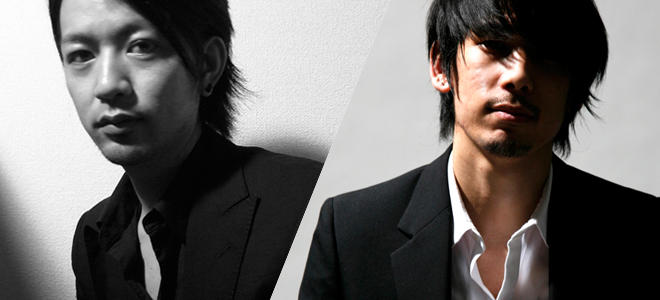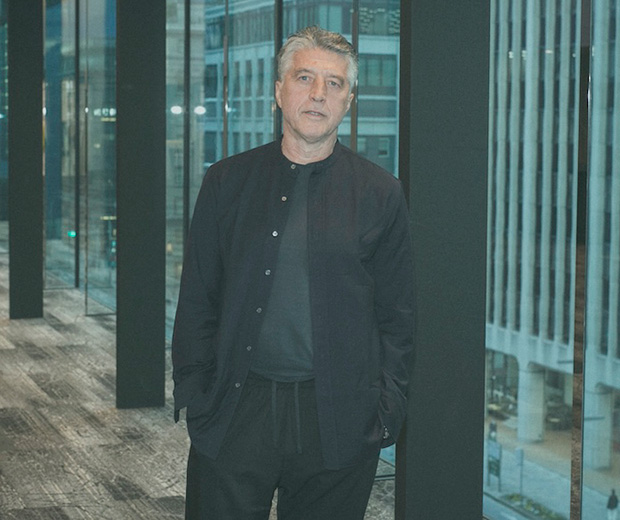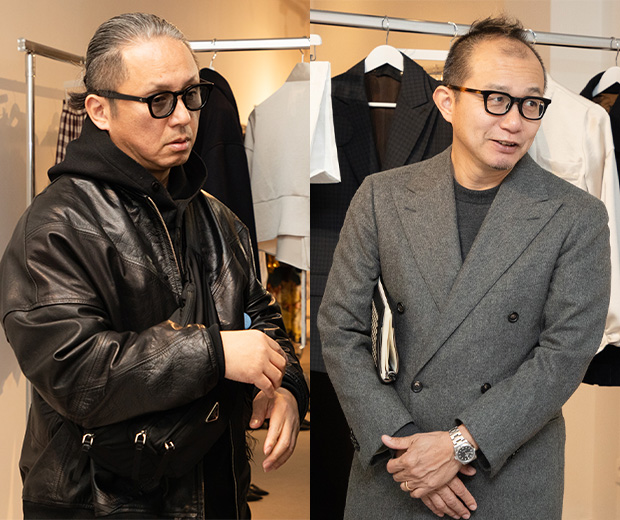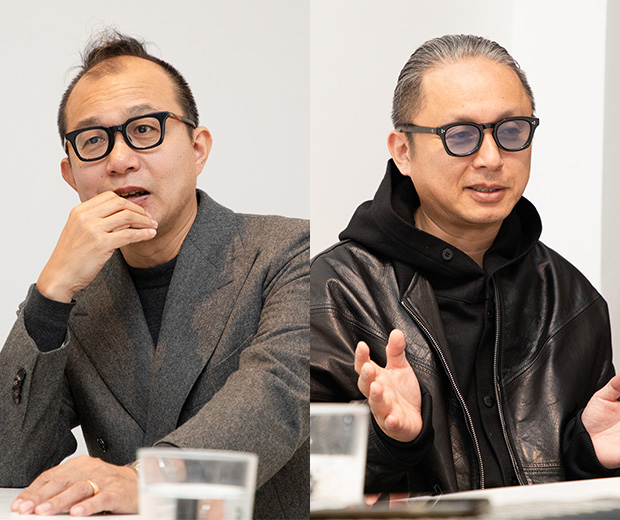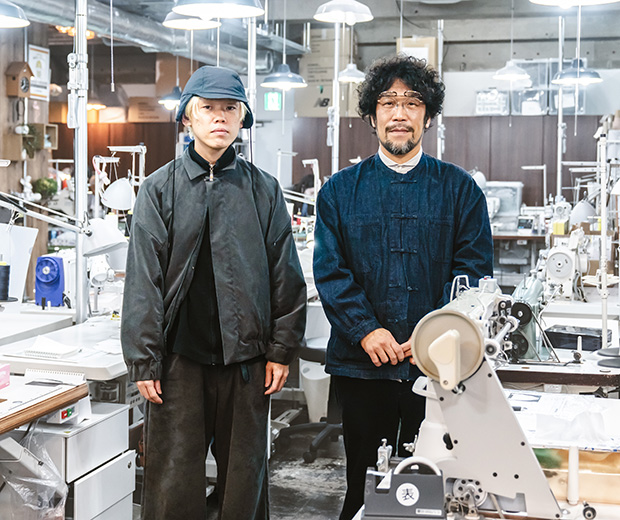Yu Amatsu × Yasutoshi Ezumi
Both chosen for the Shinmai Creator’s Project (Shinmai), which aims to nurture and support new designers, A DEGREE FAHRENHEIT and Yasutoshi Ezumi attracted attention by showcasing their collections in a joint fashion show at the Mercedes-Benz Fashion Week Tokyo 2012 S/S.
The designers of these brands, Yu Amatsu and Yasutoshi Ezumi, share many things in common such as their experience overseas in New York and London, respectively. They seem to have established an ideal relationship at a stage where both brands are currently in development.
We interviewed these two men who are expected to become the future leaders of Japan’s fashion scene.
Tell us about how you two met.
Yasutoshi: When I was starting up my own brand, I figured that I wouldn’t be able to attract many people if I do an exhibition alone. We gathered what we thought were interesting brands, and started holding joint exhibitions called &Collective Showroom& in 2010. Around the same time, I was chosen for Shinmai. A friend introduced me to Yu, who had come back from New York, and he agreed to participate in our plan. That’s how we first met.
Yu: I had been working for maisons de couture in New York, but I also had my own activities with the name, A DEGREE. I applied for Shinmai because I had always wanted to showcase my collections on a runway, but I needed to go back to Japan to participate in this project. That led me to start my activities in Japan with a new brand name, A DEGREE FAHRENHEIT.
Yasutoshi: I was chosen for Shinmai the year after him. I was in London before I launched my brand, and after returning to Japan, I spent a year doing freelance work while preparing for my brand to launch. In A/W 2010, I started my brand, Yasutoshi Ezumi. I showcased my collections for the first two seasons at exhibitions, and then I was chosen for Shinmai.
Tell us your impression of Shinmai after participating in it.
Yasutoshi: Doing a fashion show required a significantly larger number of patterns than the exhibitions that I had been doing, so it was a lot of work to prepare them. But in the end, it was a good opportunity for me. The show ended up being cancelled due to the earthquake, so we only showcased our collections online, but we received quite a bit of feedback from the media, and it allowed our brand’s activities to expand. I think Yu produced a huge number of patterns from the very first season, didn’t you?
Yu: I was producing around 80 patterns. In my case, the number of patterns wasn’t an issue, but I had a hard time catching up on the industry in Japan. I didn’t know anything about the fabric manufacturers and wholesalers. At first, there weren’t that many stores that would retail my products just because I was chosen for Shinmai, but after actually participating, I think I have gained a lot more recognition now, and wherever I go, most people know my brand to some extent.

A DEGREE FAHRENHEIT 2010-11 A/W

Yasutoshi Ezumi 2011-12 A/W
In the Mercedes-Benz Fashion Week Tokyo 2012 S/S held in October, you also showcased your collections on the runway. Shinmai was also a fashion show, but they were different, weren’t they?
Yasutoshi: They were. For Shinmai, you just needed to prepare the clothes and the rest would be taken care for the show. But for the one in October, although it was a joint show, the brands had to take the lead and we had to work on the overall production including staging and show management. It was quite a lot of work. Brands of a certain size have a certain level of manpower, but there are still many difficulties for a brand still small like mine. But I think it was a good experience to participate in this, and we are already preparing for March based upon on that.
Yu: We participated in this event as new generation brands to be supported through the Creative Business Development Program, and we received a lot of support in terms of venue and actual production cost. I think it is important to continue to provide this kind of support.

By the way, what efforts are being made in London and New York to support young designers?
Yu: In New York, basically business comes first, which is different from the new generation program. For example, there are many cases where some brand becomes the sponsor and showcases young brands as a type of entertainment on TV and such.
Yasutoshi: In London, there are various groups and projects, such as New Generation (NEWGEN) and Fashion East, that support young designers and makes it easier for them to come out. You can see how brands that participated in such projects become self-sufficient and bigger later on. I think the new generation support program can become something like a gateway for young designers if they can establish and continue to provide a stronger back-up structure for brands.
Yu: I felt that there could be more effort placed in inviting buyers from overseas. The quality of the Fashion Week itself is high, and there are many Japanese people with talent and technical skills, but the Tokyo Fashion Week seems to be closed compared to the Fashion Weeks overseas. If there could be back-up for that at the national level, I think it would further encourage the development of young brands.
I would like to ask more about the joint fashion show that was held last October.
Why did you decide to do it together?
Yasutoshi: When I went to see the venue for the collection with Yu, we kind of decided to do it together without either of us really taking initiative. Our workshops are right next to each other, so it’s easy to keep in close touch, and also our brands showcase different tastes, we feel that both brands are at around the same stage. We thought that if we could get these two brands to do a show together, it would attract attention and there could even be some synergy effect. In the preparation stage, Yu, A DEGREE staff and I communicated and worked together.
Yu: I’m really thankful for Yasutoshi’s group for taking the lead, especially in running the show.
Yasutoshi: We had some meetings but most of it was on logistics. We saw glimpses of each other’s samples, but we didn’t meddle in each other’s business in that respect, to the extent that we didn’t know each other’s theme for the collections. But since our strengths are different, mine being knits and his being fabrics and patterns, we were able to learn from each other in such technical areas.
Yu: For example, the production process for knits is very unique, and in many cases, it is difficult to communicate with the factories unless you have expertise. One of the good things about doing a joint show was to be able to help each other out in such cases. Of course, we are also rivals, but I think we have a good balance in our relationship.
Yasutoshi: It is good that we have different strengths. We hardly talk about design, but we often exchange information on brand management and technical aspects. He is a good person to consult and we both inspire each other.

A DEGREE FAHRENHEIT 2012 S/S

Yasutoshi Ezumi 2012 S/S
Do you have any thoughts on the current fashion scene in Japan?
Yasutoshi: The fashion scene in Japan is very unique and cannot be seen anywhere else. First of all, there is a very large number of consumers, so I feel like the market is always changing dynamically. Currently, there is also a strong trend in Japan for fast fashion, but I don’t think this will last forever. These trends tend to go through cycles depending on the economy. I think it is important to not be led astray by them, but to gradually build up a brand image, express it and establish a style.
Yu: Previously in Japan, there was a unique situation where the general public read collection magazines, but there is much less of that now. On top of that, with the popularity of fast fashion, domestic brands are not standing out as much anymore. That is just sad. There is even a general impression that being fashionable is a little embarrassing. “Being a little different” is popular because everyone is watching what other people are doing, but I would like to go against that and propose designs that are sexier and showier.

On the other hand, how do you feel about other countries?
Yasutoshi: I would like to expand overseas after spending about three years establishing a foundation in Japan. Currently, we are coming to a stage where we are looking at Asia and need to coordinate with them, and I think Japan needs to take the lead and hold large exhibitions and fashion shows in various cities in Asia.
Yu: Ideally, I would like to have an office in both Japan and New York. But first, I would like to establish a base. Japan has high quality manufacturing for materials and sewing, so I think it would be best to establish a strong foundation and take those good things abroad.
Yasutoshi: I feel the same way. In London’s case, there are not many factories domestically, so we had to order from factories overseas, such as those in Italy, Turkey and Hong Kong, which makes it difficult to communicate with them. Factories in Japan are currently in a difficult situation, but they still give their best and make good products. I would like to establish good relationships with such places and grow together.
Lastly, do you have any ideas for the next collection?
Yasutoshi: We are planning to do the next one separately. Our brand concept is &kotowari (logic)&, and we always start off from thinking about &physics& and &rationality&. The theme for the next collection will also be related to that, but we plan to express our worldview in a more condensed way than ever before. We are working on planning the presentation so that it will be &a fashion show that you can physically experience&.
Yu: I heard some of those ideas from him, and it sounds like it’s going to be pretty interesting. I can’t give out a lot of details yet, but my theme is always &temperature&, and I plan to have that as the center of my next collection too.
Designer for A DEGREE FAHRENHEIT
After working as a freelance costume designer, Yu moved to New York alone in 2004. He won the grand prize for two consecutive years in the Gen Art International Design Competition - the largest fashion contest in the U.S. that has produced many designers such as Zac Posen and Philip Lim - and received recognition for his high quality creations and novel designs from buyers and famous designers worldwide. Yu came back to Japan in 2009 after being chosen for the Shinmai Creator's Project sponsored by JFWO, and made his debut in the 2010 A/W Tokyo Collection. He established 212 Co., Ltd., which designs both men's and women's apparel.
Yasutoshi Ezumi - left
Designer for Yasutoshi Ezumi
Yasutoshi studied fashion and textiles at Central Saint Martins College of Art and Design in London. He gained experience at fashion houses such as Alexander McQueen, and was the knitwear designer for Aquascutum for their 2008 S/S and A/W Collections. After returning to Japan, Yasutoshi worked as a fashion/textile designer and art director, and launched his fashion brand, Yasutoshi Ezumi, in 2010 A/W. He was chosen for the 2011 Shinmai Creator's Project sponsored by JFWO, and began participating in the Tokyo Collection from 2011 A/W.

